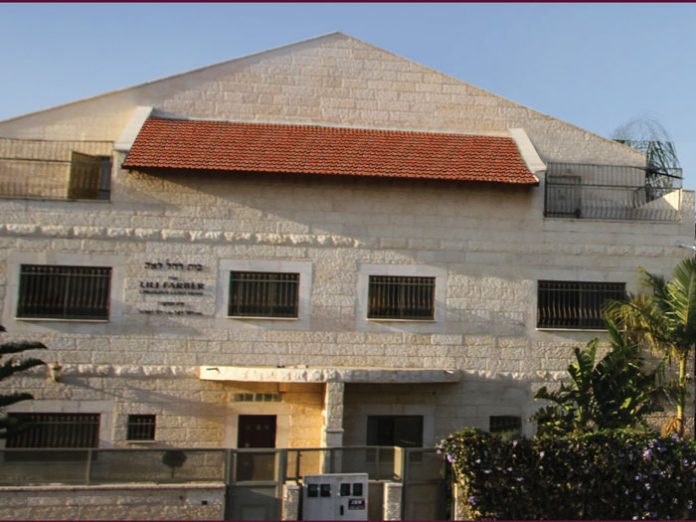“If you want to do an article for Shavuos about women and Torah, I have the perfect story for you,” the email I received from a friend began. “There’s a woman named Rebbetzin Yehudit Adler who lives in Ramat Shlomo. She has an organization that helps poor people and almanos and whoever else is in need. Believe it or not, she also runs a yeshivah for handicapped bachurim. It is in her zechus that Torah is learned by these heilige neshamos.”
When I called Rebbetzin Adler and told her that I would love to meet with her, she was enthusiastic about the idea, excited that it would make more people aware of the needs of handicapped children, and perhaps inspire others to open similar yeshivos around the world. In fact, she immediately said that she would make herself available to anyone who wanted to help launch one. “But before me meet,” she went on, “I want you to see something.” She then sent me a link.
I watch the clip and I am moved to tears. A group of young handicapped bachurim, most if not all in wheelchairs, are celebrating a siyum and dancing with singer Yoeli Klein and some chasidishe bachurim. The atmosphere is electric and you can feel the joy. When I finally meet Rebbetzin Adler I tell her, “I saw the video and it made me very emotional. Aside from seeing the simchah of the boys who are handicapped, it was so heartwarming to see the other boys giving of themselves so lovingly.”
“It’s transformational for both sides,” she agrees. “Not only do the handicapped bachurim benefit but so do the volunteers. Their lives just aren’t the same afterwards.”
“What I find very inspirational,” I tell her, “is that it’s not just what people do, but that they’re doing it at all. A lot of us have great ideas and wonderful intentions but never act on them. We’re either met by naysayers or plagued by self-doubt, so all we do is think about what a good idea we have. That’s why it’s so amazing when someone actually takes that idea and turns it into reality. But what I’d really like to know is how all of this came about. Here you were, a mother raising her children, and baruch Hashem, marrying off four of them. At the same time, you were making Shabbatons for handicapped children, widows, widowers and terminally ill patients. Then you went out and created a yeshivah for handicapped bachurim! Was there something in your life that drew you to help children who are developmentally challenged?”
In response, Rebbetzin Adler shares with me her fascinating journey, filled with amazing siyata dishmaya and incredible experiences along the way.
“When I was growing up I hardly knew any handicapped children. When my children were born healthy, I didn’t even realize how much I had to be grateful for, because I just took it for granted. All of us are alive thanks to Hashem’s chesed chinam, and we don’t know how to appreciate it. We are living on borrowed time, and we are all recipients of handouts. That being the case, shouldn’t we try to do something with the gifts we are given? Sometimes the Aibershter gives us the zechus of letting us do something beyond ourselves. When you can take a family that’s falling apart and give them joy and a reason to go on, is there anything greater than that? I feel very blessed that this is what I am busy with and that my children are following in my footsteps.
“My passion to help the handicapped really began with my mother and grandmother. Whenever they would see a sick or crippled child on the street they would literally start crying and say, ‘A rachmanus on them and their mothers!’ They just couldn’t take it. So from a very young age I understood that when you see a child like this it’s appropriate to cry. Then I had an experience that changed my life. At the time I was in the real estate business but I was also teaching part time.
“One day I decided that I just had to go away for Shabbos, and it had to be somewhere with a beach. I had grown up in Far Rockaway, and for some reason I was desperate to see a beach. But when we walked into the lobby of the Galei Sanz Hotel in Netanya on Erev Shabbos I froze in my tracks: there were 30 or 40 wheelchairs with children sitting in them lined up in the lobby. Some of the kids were on oxygen and some had feeding tubes, but all of them were hooked up to some sort of medical paraphernalia. They were surrounded by counselors who were smiling and interacting with them and making them laugh. When I went over to the receptionist and asked her what was going on she said, ‘These are our guests.’ ‘Yes, but they’re sick!’ I exclaimed, to which she replied, ‘So what?’ She wasn’t fazed by my attitude at all. ‘If you want to go back to Yerushalayim, there’s still enough time.’ Then I asked her if they were going to be eating with us. I was very worried that my children would be traumatized and have nightmares. You don’t take your children to the pediatric ward of a hospital and let them wander around. What was I supposed to do? The woman reassured me that they would be eating in a separate dining room, but at the same time she also gave me such a look that I caught myself and realized that there was something very wrong about my way of thinking. I was ashamed of myself, and I resolved then and there that I would spend the rest of my life doing teshuvah for how I had reacted to these children.





















